What's the best source for researching Oklahoma City History? That's easy — it's the Oklahoma City Metropolitan Library System, MLS for short.
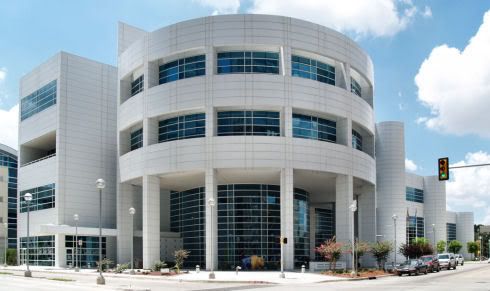
And much of it is available in your own home, or in your hotel room while you're traveling — anywhere you have a a computer and internet availability.
Some parts are available to anyone. For some of the best research tools, though, all you need to know is your MLS library card and your own last name. This brief article gets you started in seeing how to use some of the great resources of the Oklahoma City Metropolitan Library System.
To get you started, I've put together a little flash slide show. Although it runs by itself, with between 5 and 10 seconds between each slide, it contains controls to pause, move forward or backward, as you chose. Due to width and height limitations in this blogger format, three of the pages are hard to read, but a "Larger" button is available on those pages click on the button and the slide show will pause and the page will open in a separate window or tab for a larger view.
This article does not develop the history of the downtown library — click here for that. It does not particularly show how to use the Oklahoman's archives — click here for that. It does not show you how to use the Sanborn Maps feature — click here for that. The focus of this article is to point you to areas in the Metropolitan Library System that will be helpful in your Oklahoma City history research — Internet Links, below, and The Oklahoma Room at the end of this article.
INTERNET LINKS. For that, here are some MLS internet links that you may want to bookmark:
- MLS Home Page. From here, most if not all of the other items listed below can be located, even though the more direct links will get you there more quickly. However, for the numerous MLS areas and items (e.g., calendar of events, downloadable audio books area) which are not listed below, start at the MLS home page.
- Library Member Logon Page. If you are a card carrying member of the Metropolitan Library System, this is your first stop before accessing the external commercial databases which MLS gives you free access to, e.g., the Oklahoman archives and the Sanborn Maps.
MLS library cards are free for qualifying persons. Generally, that includes those who live in or own property in Oklahoma City or Oklahoma County and, via a reciprocal service agreement with the Pioneer Library System headquartered in Norman, those who live, work, or attend school in Cleveland, McClain or Pottawatomie counties and for Blanchard school district students living in Grady County. Go here for more particulars.
The two commercial databases that I use regularly are the Oklahoman archives and Sanborn Maps, below. - Oklahoman archives. There is no direct link for this. After logon, click the Databases menu item and then click the Newspaper tab. On the page that opens, click on Oklahoman Electronic Archives. For detailed instructions, click here.
- Sanborn Maps. There is no direct link for this. After logon, click the Databases menu item and then click the Oklahoma tab. On the page that opens, click on Sanborn Maps. For detailed instructions, click here. Buddy Johnson also advises that, in addition to these on-line versions, the downtown library also has original microfilm which is much more legible, very large size and can be printed on 11 x 17 inch paper. A very high resolution image can also be obtained from the Sanborn map PDF files but only if you have a full version of Acrobat (or a similar program, but not Reader) since in such a program you have the option of extracting images in PDF files and saving them to a TIF (best) or other graphic format. The images so extracted from a Sanborn map file are typically 5100 x 6088 pixels at 600 dpi, which ain't too shabby. After extraction, it becomes possible to crop an image to suit your needs.
- Oklahoma Images. Although this area can also be accessed via the databases after member logon, it's not necessary to do that since this area is not restricted to library members. Here, images of the city's past, as well as essays on many different topics, can be searched for, seen and read.
- Oklahoma Folklore Collection. Like Oklahoma Images, this database collection is available to non-MLS members. I didn't include anything about this in the above slide show, so here's a graphic showing this area's portal page — click the image for a larger view:
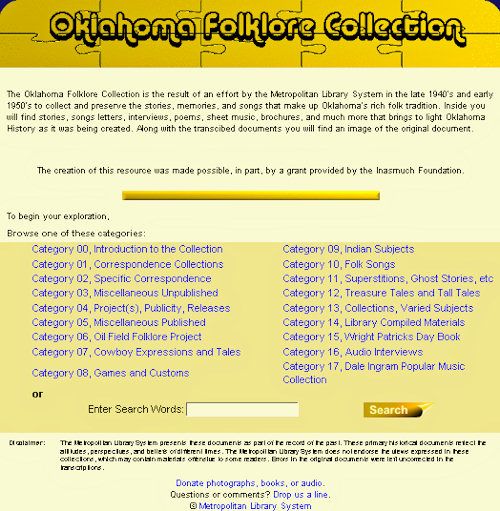
The fine print at the top reads, "The Oklahoma Folklore Collection is the result of an effort by the Metropolitan Library System in the late 1940's and early 1950's to collect and preserve the stories, memories, and songs that make up Oklahoma's rich folk tradition. Inside you will find stories, songs letters, interviews, poems, sheet music, brochures, and much more that brings to light Oklahoma History as it was being created. Along with the transcribed documents you will find an image of the original document."
- info Magazine. This is MLS's monthly magazine. It always contains an interesting Oklahoma City history article (usually if not always written by Larry (Buddy) Johnson) — the above slide show presents 3 of them. As well, the magazine contains other interesting articles and the MLS monthly calendar of events which is quite extensive. The files are PDF files which require a recent version of the Adobe Acrobat Reader (my old 5.0.1 version of the full Acrobat program cannot read them but after installing the latest version of the Reader, all went well).
- Videos About Oklahoma Images. The introductory text at this page reads, "For years you could view the Oklahoma Images collection of photographs chronicling the history of central Oklahoma on our website. But now hear the stories that go with them. Downtown librarian and historian Larry Johnson has written the stories behind these fascinating pictures, while local attorney/historian Bob Burke tells the tale. Check back with us every few weeks for new Oklahoma Images stories and read 'Oklahoma Images' every month in our magazine, info." Click on the following graphic for a larger view of the videos that are presently available:
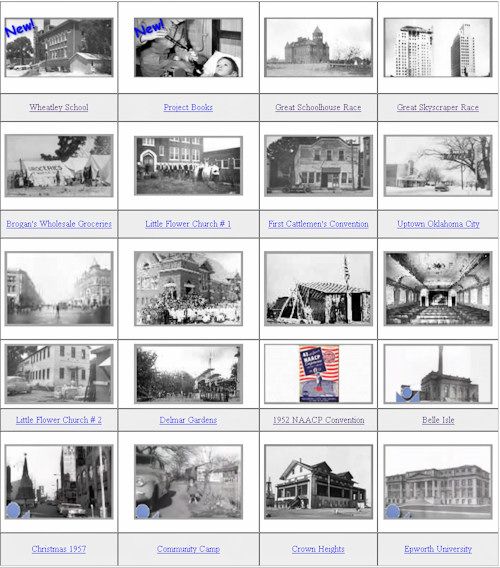
- Oklahoma County Building Index. This nifty MLS feature is hard to find but it's in the in-house database area. Click the graphic below for a larger view.
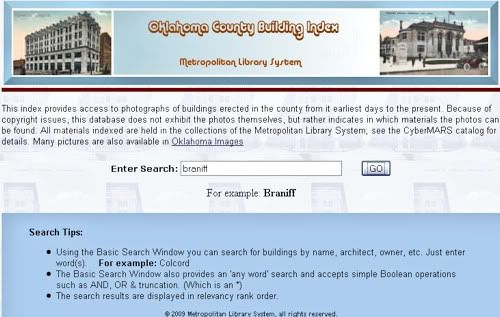
Doing a search for "Braniff" shows what is returned — click the image below for a better view.
Braniff Building
My only criticism of the Oklahoma County Building Index database/feature is that there does not appear to be an "index" of the Index so that a list of included buildings is presented at a glance. That would be handy to have, particularly since the page's name includes the word, "Index." One has to know/remember the name of a building to search for it and a single list would be particularly helpful for those having not-the-best memory brain cells like me! That said, it's a handy resource and well worth having. A work-around to the absence of a list is to type, "OK," as the item to search for and 300 Abstracts are returned, which I take to be number of items in the database. You can also search by street (spell out the numbered streets) or by address.
Building Name: Braniff Building
Building Name2: Kerr-McGee Building
Building Name3: Three Twenty-Four Building
Street Address: 324 North Broadway
City: Oklahoma City
State: OK
Neighborhood: Downtown
Architect: Solomon A. Layton
Architectural Firm: Layton, Hicks, and Forsythe
Construction Firm:
Construction Date: 1923
Owner/Tenant: Thomas E. Braniff; Braniff Airlines
Photo Date:
Format: Book
Source: PLBOC, p.56; VSII plate 192
Notes:
Subject: Office Buildings
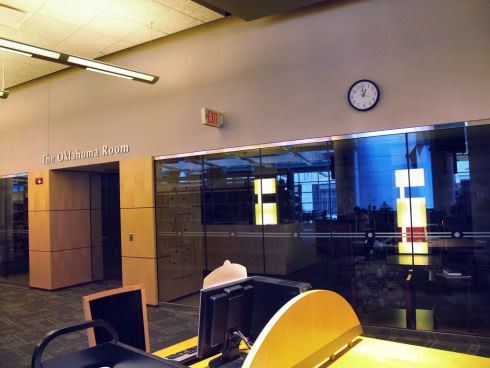
The Oklahoma Room contains the MLS collection of quality books and other documents (e.g., old plats, maps, etc.) which specifically focus on Oklahoma (and Oklahoma City). Often those books are rare and out-of-print and they are often fundamentally important when a researcher is looking for detail about numerous Oklahoma City history topics.
This room is not generally available but it does have availability at the following times:Below are a few pics taken September 22, 2009, inside the Oklahoma Room. My host was Larry (Buddy) Johnson who maintains the room and under whose guidance, often pen, research of Oklahoma City history by the MLS is done. Above, you will have noticed that he writes brief Oklahoma City history articles in each info magazine and that his lengthier essays are found in MLS's Oklahoma Images database.
- Monday through Thursday: 1:30 pm - 4:30 pm
- Other times by appointment — call 606-3872
He should have a grander title than "librarian," so Doug Dawg will given him one — MLS Okc History Boss-Man. I fully expect that those who work with him to begin calling him that right away! About Buddy, info Magazine says,
Larry "Buddy" Johnson has been with MLS since 1998. Not only a librarian at the Downtown Library, he is the brilliant mind behind the Oklahoma Images database which is a collection of pictures and essays that illustrate the history of central Oklahoma.

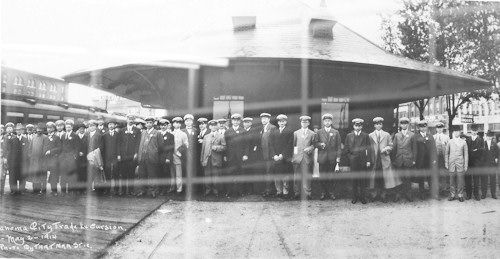

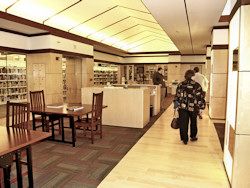
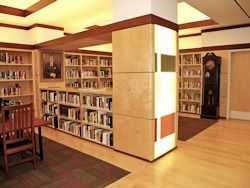
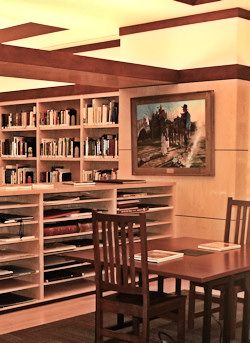
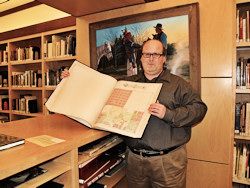
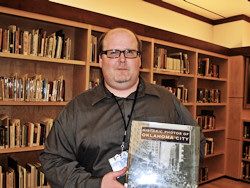
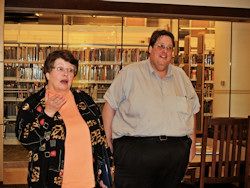













2 comments:
When will you be able to share what the secret group is?
Thanks for asking. Hopefully by the end of year, or sooner.
Post a Comment